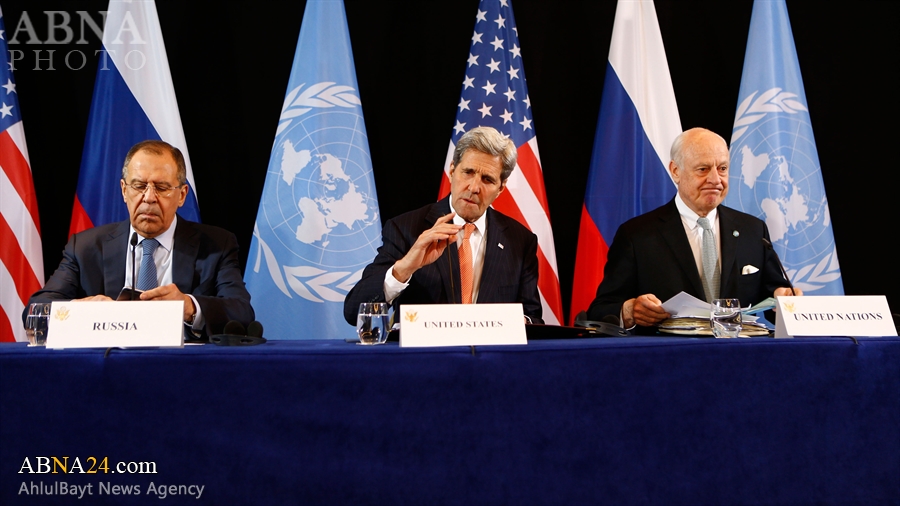(AhlulBayt News Agency) - While the devastating war is still monstrously sweeping through Syria, the engaged sides in the crisis are striving after a comprehensive ceasefire deal with specific terms– a ceasefire that at least cuts down the fatalities to the lowest possible number.
Last week's Friday, the Russian Foreign Minister Sergey Lavrov and the US Secretary of State John Kerry attended a joint press conference after several hours of discussion in Geneva to talk to the journalists about a bilateral agreement on a truce in Syria– a truce that look interesting on the paper but we need to see if it is implementable in the battlefield, as there are a slew of hurdles impeding the cessation of the fire including failing to draw clear line between the Syrian moderate opposition forces and the terrorist groups.
The agreement which won approval of Syria and Turkey had its own supporters and opponents like the terrorists who think they must be party to the political settlement of the Syrian crisis.
Who is for the ceasefire?
In the afternoon of the day the press conference was held in Geneva, the central Syrian government announced accepting the deal agreed upon by Moscow and Washington but the Syrian opposition groups, those who promote themselves as pro-democracy and freedom, announced agreement to the deal a day after Damascus. This, according to the analysts, is considered a positive point for the government of President Bashar al-Assad, indicating that the central Syrian government more than any other side is seeking to end the over seven-year battle.
Who is against the deal?
On the other side of the equation are the terrorists who due to their relations with Saudi Arabia and the US are still living on across Syria. Perhaps one of the most destructive legacy that the war in Syria left was that the terrorist groups came up with the belief that they can rule Syria and so play role in the political future of the country. Remarks of spokesman for the Ahrar ash-Sham terrorist group are considerable. Abu Yousef al-Mohajer said that the agreement was between Russia and the US and because their group was not party in the negotiations they would not approve of the truce.
The press conference of Lavrov and Kerry carried a couple of important points. Perhaps the most interesting point was the Americans' conditions for cooperation. They said that if the truce lasted for a week, they will coordinate with the Russians to hit ISIS and Jabhat ash-Sham (formerly al-Nusra Front) positions in Syria, otherwise their collaboration to strike the terrorist groups and ignore the so-called moderate armed groups is unlikely.
Impossible mission
Certainly, the Americans know that holding the fire in Syria is very difficult if not impossible. Dozens of terrorist groups and also so-called moderate armed groups are fighting in Syria. Their forces' number vary from thousands to hundreds of thousands. In the very chaotic conditions of Syria, a country that is scene for a mix of groups including the nationalists, takfiri terrorists, Salafists, foreign mercenaries that are fighting each other and also battling the Syrian government, can it be fully hoped that the US and Russia-brokered ceasefire yields desired results, not be similar to the earlier ceasefires, and the terrorists would not use it to re-strengthen?
There is a very slim chance that the truce can be a healer for Syria pains. The US must know that as long as pro-terrorists sides are active it is impossible to end the war or at least control it with moves like the ceasefire that was approved on Friday in Geneva. Political negotiations and a real move against origins of terrorism must go ahead simultaneously. If the Americans do so, it is possible to be optimistic about effects of the truce. It must be seen if Washington that does not want to disclose documents and reports about involvement of its close friend and ally Saudi Arabia in 9/11 terrorist attacks is ready to talk to Riyadh to persuade it into halting its unceasing supports for the terrorism in Syria.
/298

